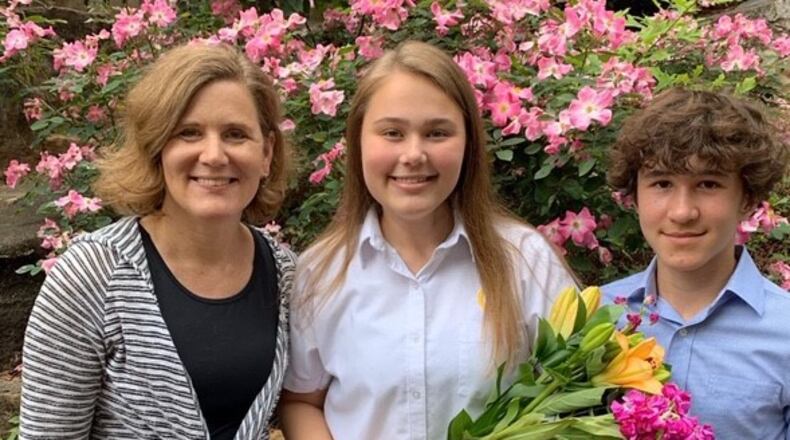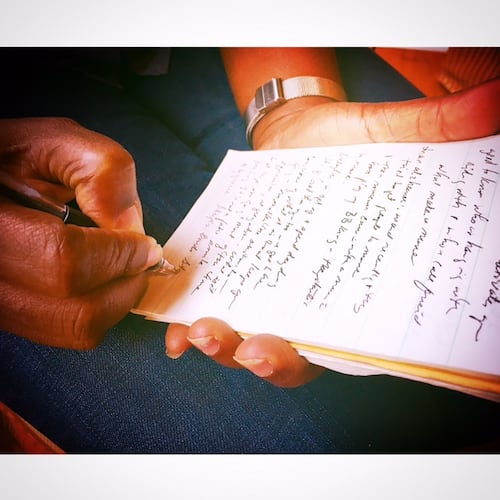In Marni Ratner’s mind, her husband Jon was like a modern-day Renaissance man.
He was thick-skinned and knew how to wheel and deal in business, but Jon had another side, too. He possessed an appreciation for the opera and a strong love of animals, but he also loved working in the yard, getting his hands dirty. He was a softie on the inside but had a strong and confident exterior.
Marni chalked that up to his being born a Yankee, a middle child to Irv and the late Lynn Ratner of Cherry Hill, New Jersey.
It was their dream that Jon would be a doctor like his father, an orthopedic surgeon, but after earning a liberal arts degree from Emory University in 1992 and taking the MCAT, Jon had other ideas. He spent several years mixing drinks and working in the kitchen in restaurants before going to work for a national ticket broker.
By the time he met Marni, he’d struck out on his own.
Those were just some of the details Marni and other family members shared with Rabbi Peter Berg as he prepared Jon’s eulogy.
The conversation, though, wasn’t just about how Jon lived. It was about how he died, too. Did she want people to know?
“I immediately said yes,” Marni remembered. “I wanted people to know ... that he’d struggled even though they didn’t see it. Besides, it wouldn’t be worth the emotional energy to come up with a cover-up.”
Marni found Jon dead in his closet from a self-inflicted gunshot wound to the head on Sept. 24, 2009.
In Judaism, you’re typically buried within 24 hours of death. With Shabbat falling as it did, Jon’s graveside service followed two days later on the eve of Yom Kippur, his favorite of all the High Holiday services, and was attended by close to 400 people.
He was laid to rest in Arlington Memorial Park in Sandy Springs, the place where Marni, Diana and Daniel would mark his birthday eating cake for years to come.
After the service, family and friends gathered at Marni’s parents' home to sit shiva, an ancient Jewish custom that surrounds the bereaved with the living.
“I remember wanting to hide,” Marni said. “There were so many people that it seemed like a big social event.”
That’s the whole point, to avoid dwelling morbidly on the dead.
Marni was in no mood to entertain. She retreated to her parents' bedroom and remained there over the next week.
“None of us were in a hurry to get back to the house because that’s where it happened,” she said.
This is the final installment of a three-part series — “Not My Secret" — detailing Marni’s journey from grief to grace.
As out-of-town family returned home and everyone else fell back into their routines after Jon’s death, Marni, the kids and her mom, Susan Feinberg, returned to the Ratner home. In keeping with expert advice to get the kids back into their regular routine as soon as possible so that they would feel safe and secure, Daniel and Diana returned to school.
Marni struggled to be present.
“I felt like the color of mud, like every single emotion mixed together at the same time,” she remembered. “I often felt far removed and stuck.”
Are you OK? asked her mom repeatedly.
“Please don’t utter those three words to me ever again,” Marni finally shot back. “No. I’m not OK.”
She wished she had a letter on her forehead that told her story. She resented the question as much as she did offerings of antidepressants to help her cope, to help her sleep.
She thought it was odd that “people think you can treat grief with a pill. You can’t go around it, you have to go through it.”
The strongest thing Marni had ever taken in her life was aspirin, but she acquiesced.
“It made me feel horrible but it was good for sleeping,” she said.
Nights and birthdays and special occasions like Daniel’s and Diana’s bar and bat mitzvahs were particularly hard for Marni. Nights were when she felt the loneliest. Nights were when she and Jon always reconnected, watched television, talked about their day.
Credit: Courtesy of Marni Ratner
Credit: Courtesy of Marni Ratner
In many ways, Marni’s life felt like a house of cards now, like she was propping herself up for show for everyone else’s benefit.
“I felt like that for a long time,” she said.
After nearly two months, Marni managed to nudge her mom back home. A series of nannies would follow, each bringing with them the things Diana and Daniel needed most. The first was young but incredibly loving and nurturing. The next was the perfect combination of a loving yet firm disciplinarian. A third one was all encompassing, able to not only manage the Ratner household but be the objective confidant Marni needed.
While Daniel went with the flow, enjoying having a playmate other than his sister, Diana oftentimes felt threatened by the nannies, wondering why they were taking over the house.
Time marched on as it always does, but not even time seem to wipe away the grief Marni felt. Attending counseling sessions at the Link Counseling Center with Diana helped.
“The first day I went to the Link and participated in an informal parent group while the kids were in theirs, someone said year two is so much worse than year one,” Marni remembered.
Credit: Courtesy of Marni Ratner
Credit: Courtesy of Marni Ratner
That seemed impossible but they were right.
“Year two starts and you just feel like another wave hit," Marni said. "Now you’re really all alone because people who helped you through the first year start dropping off because they think you’re good now.”
Marni was ready to try and move on, too. She’d grown tired of talking about Jon, what happened and why.
“I’m ready to talk about me,” she told her therapist. “Where do I go from here and how do I move on?”
As she refocused on her future, Marni threw herself back into her business at Studio M Interiors. She reclaimed her place in Diana’s and Daniel’s lives. And after two solid years, she finally opened the door to Jon’s closet and started going through his things.
“I had some really good profitable years after that,” she said. “And then I guess, I started to date.”
Daniel, now 14, and Diana, now 18, continued to grow and thrive. He is a high school freshman who enjoys rock climbing and unicycling, a skill he learned at circus camp. A deal-maker like his dad, he started his own sneaker trading business during quarantine. And Diana, who graduated last year from The Atlanta Girls' School, is a freshman at the University of Georgia.
Marni told me that Jon’s leaving might have been easier had he died, say, in a car accident because maybe she could’ve closed the chapter of why much sooner.
“With suicide, you’re left with so many unanswered questions," she said. “With suicide, you have to almost create your own narrative of what, why, and how it happened.”
The Ratners are still writing that narrative, but they are at peace.
Grief is no longer a constant companion, just an occasional visitor.
Find Gracie on Facebook (www.facebook.com/graciestaplesajc/) and Twitter (@GStaples_AJC) or email her at gstaples@ajc.com.
READ MORE
Read Parts 1 and 2 of the “Not My Secret” series at www.ajc.com/staff/gracie-bonds-staples/
MORE INFORMATION
September is National Suicide Prevention Awareness Month.
For help:
Call the National Suicide & Crisis Hotline at 1-800-273-8255.
Or contact the Link Counseling Center at 404-256-9797 or thelink.org.
About the Author
The Latest
Featured





